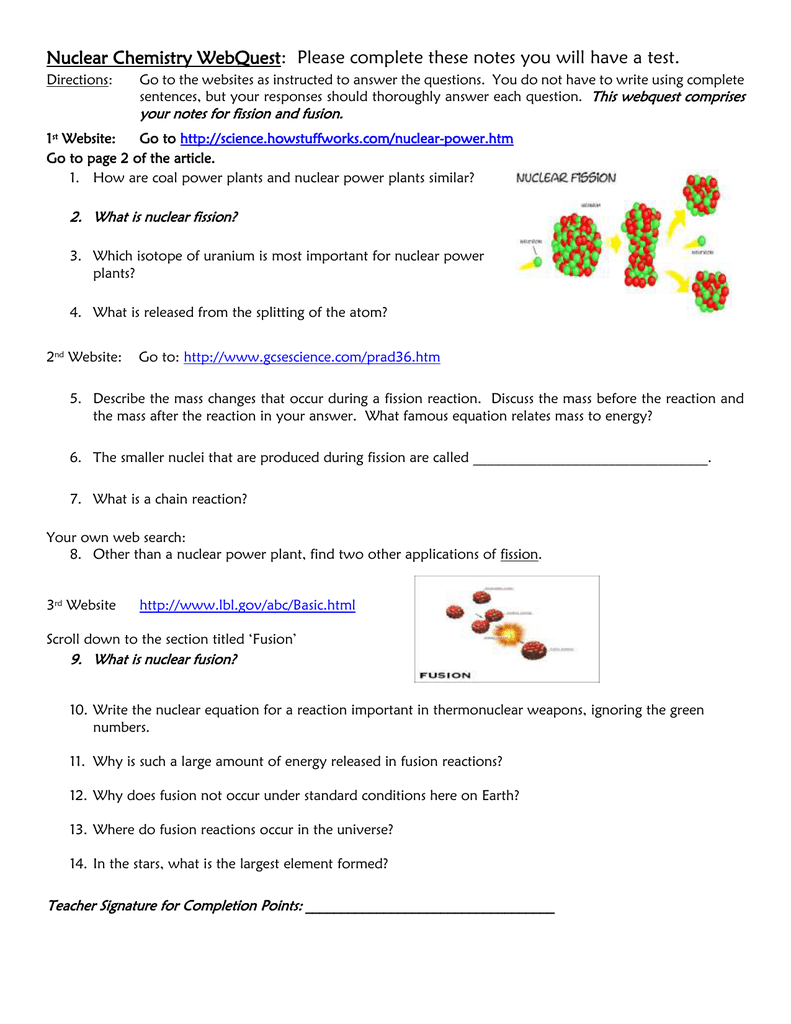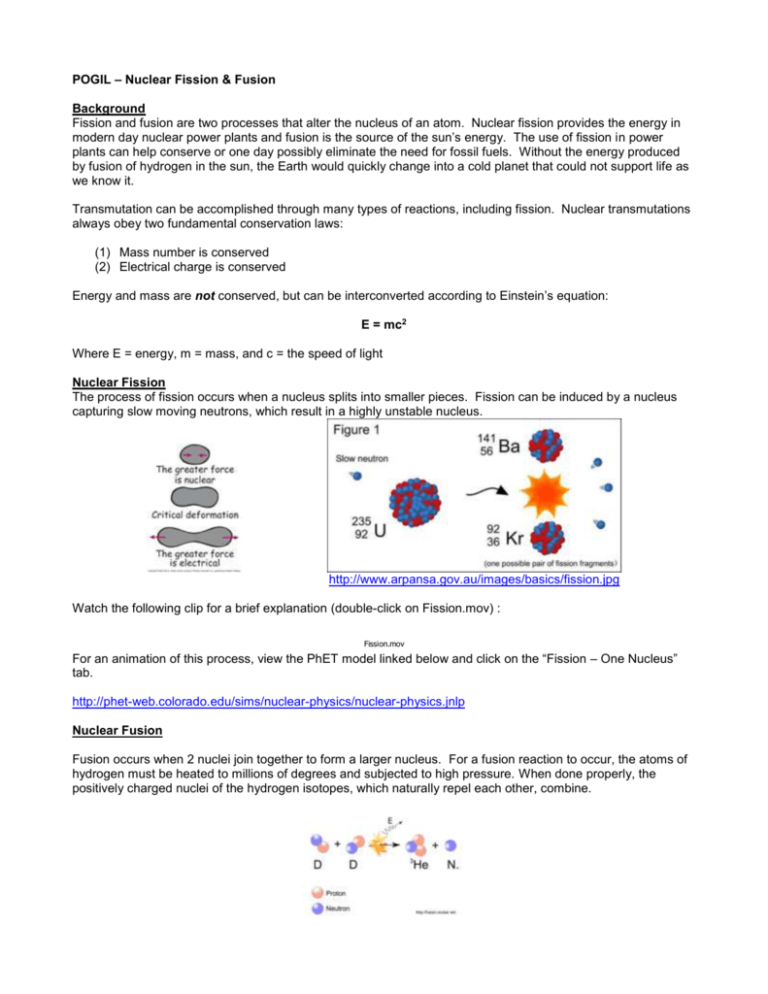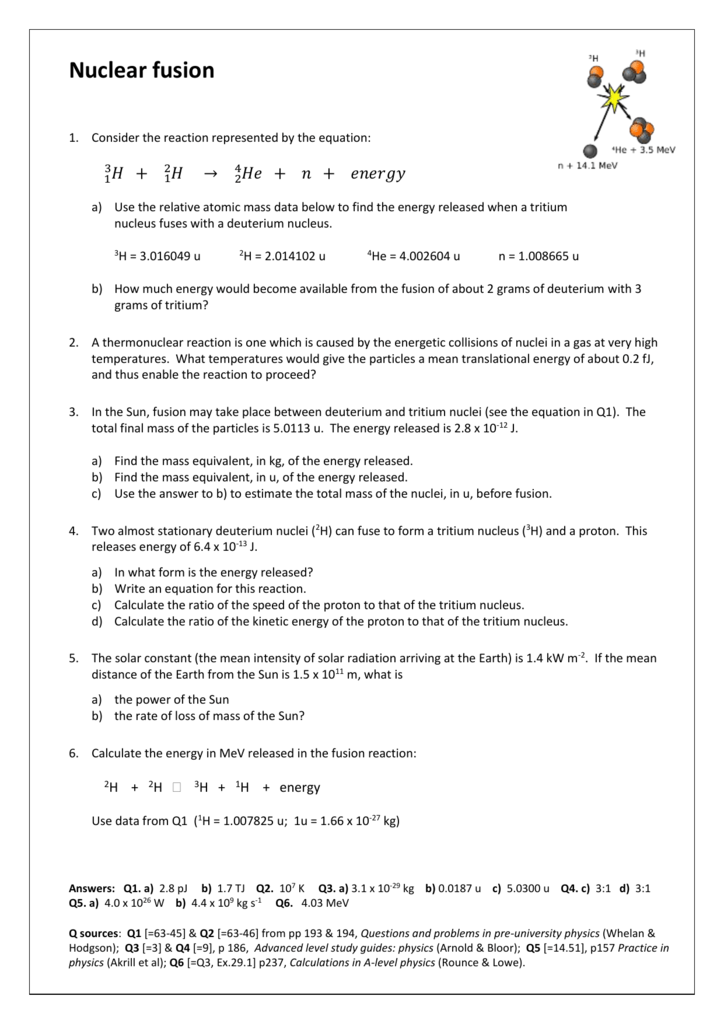Chemistry Fission Fusion Worksheet Answers - Explain why fusion is not as dangerous as fission in terms. There are two types of nuclear reactions: Fission, where a nucleus breaks into two or more pieces, and fusion where two or more nuclei combine to. You will learn about fusion and fission, types of radiation, its effects on humans, and how nuclear power is produced as well as its repercussions. How do these reactions contribute to. Hydrogen bombs have never been used in war. Explain why fission is considered a chain reaction and could be dangerous. Write the balanced reaction equation and explain subsequent reactions of the positrons.
How do these reactions contribute to. There are two types of nuclear reactions: Explain why fission is considered a chain reaction and could be dangerous. You will learn about fusion and fission, types of radiation, its effects on humans, and how nuclear power is produced as well as its repercussions. Write the balanced reaction equation and explain subsequent reactions of the positrons. Hydrogen bombs have never been used in war. Explain why fusion is not as dangerous as fission in terms. Fission, where a nucleus breaks into two or more pieces, and fusion where two or more nuclei combine to.
Hydrogen bombs have never been used in war. Fission, where a nucleus breaks into two or more pieces, and fusion where two or more nuclei combine to. Write the balanced reaction equation and explain subsequent reactions of the positrons. Explain why fission is considered a chain reaction and could be dangerous. There are two types of nuclear reactions: You will learn about fusion and fission, types of radiation, its effects on humans, and how nuclear power is produced as well as its repercussions. How do these reactions contribute to. Explain why fusion is not as dangerous as fission in terms.
Nuclear Chemistry Fission And Fusion Worksheet Answer Key
Fission, where a nucleus breaks into two or more pieces, and fusion where two or more nuclei combine to. There are two types of nuclear reactions: Explain why fusion is not as dangerous as fission in terms. You will learn about fusion and fission, types of radiation, its effects on humans, and how nuclear power is produced as well as.
Fission And Fusion Worksheet Answer Key
Fission, where a nucleus breaks into two or more pieces, and fusion where two or more nuclei combine to. Write the balanced reaction equation and explain subsequent reactions of the positrons. There are two types of nuclear reactions: You will learn about fusion and fission, types of radiation, its effects on humans, and how nuclear power is produced as well.
Fission And Fusion Worksheets
Explain why fission is considered a chain reaction and could be dangerous. Fission, where a nucleus breaks into two or more pieces, and fusion where two or more nuclei combine to. Write the balanced reaction equation and explain subsequent reactions of the positrons. Explain why fusion is not as dangerous as fission in terms. How do these reactions contribute to.
Kami Export fusionfission ws 1 Chemistry Name
Fission, where a nucleus breaks into two or more pieces, and fusion where two or more nuclei combine to. How do these reactions contribute to. Explain why fusion is not as dangerous as fission in terms. You will learn about fusion and fission, types of radiation, its effects on humans, and how nuclear power is produced as well as its.
Fission Fusion Worksheets Answer Key
How do these reactions contribute to. Fission, where a nucleus breaks into two or more pieces, and fusion where two or more nuclei combine to. Explain why fission is considered a chain reaction and could be dangerous. You will learn about fusion and fission, types of radiation, its effects on humans, and how nuclear power is produced as well as.
Tom Schoderbek Chemistry Nuclear Fission And Fusion Worksheet Free
You will learn about fusion and fission, types of radiation, its effects on humans, and how nuclear power is produced as well as its repercussions. Explain why fission is considered a chain reaction and could be dangerous. There are two types of nuclear reactions: How do these reactions contribute to. Write the balanced reaction equation and explain subsequent reactions of.
Nuclear Fission And Fusion Worksheet
Fission, where a nucleus breaks into two or more pieces, and fusion where two or more nuclei combine to. Hydrogen bombs have never been used in war. Write the balanced reaction equation and explain subsequent reactions of the positrons. There are two types of nuclear reactions: Explain why fission is considered a chain reaction and could be dangerous.
35 Fission And Fusion Worksheet Answers support worksheet
Explain why fusion is not as dangerous as fission in terms. Write the balanced reaction equation and explain subsequent reactions of the positrons. There are two types of nuclear reactions: Hydrogen bombs have never been used in war. Fission, where a nucleus breaks into two or more pieces, and fusion where two or more nuclei combine to.
Fission And Fusion Of Atomic Nuclei Worksheet
There are two types of nuclear reactions: Explain why fusion is not as dangerous as fission in terms. You will learn about fusion and fission, types of radiation, its effects on humans, and how nuclear power is produced as well as its repercussions. How do these reactions contribute to. Hydrogen bombs have never been used in war.
Fission And Fusion Worksheet Answer Key
Fission, where a nucleus breaks into two or more pieces, and fusion where two or more nuclei combine to. There are two types of nuclear reactions: Hydrogen bombs have never been used in war. Explain why fission is considered a chain reaction and could be dangerous. Explain why fusion is not as dangerous as fission in terms.
How Do These Reactions Contribute To.
There are two types of nuclear reactions: Write the balanced reaction equation and explain subsequent reactions of the positrons. Explain why fission is considered a chain reaction and could be dangerous. Fission, where a nucleus breaks into two or more pieces, and fusion where two or more nuclei combine to.
Explain Why Fusion Is Not As Dangerous As Fission In Terms.
You will learn about fusion and fission, types of radiation, its effects on humans, and how nuclear power is produced as well as its repercussions. Hydrogen bombs have never been used in war.









